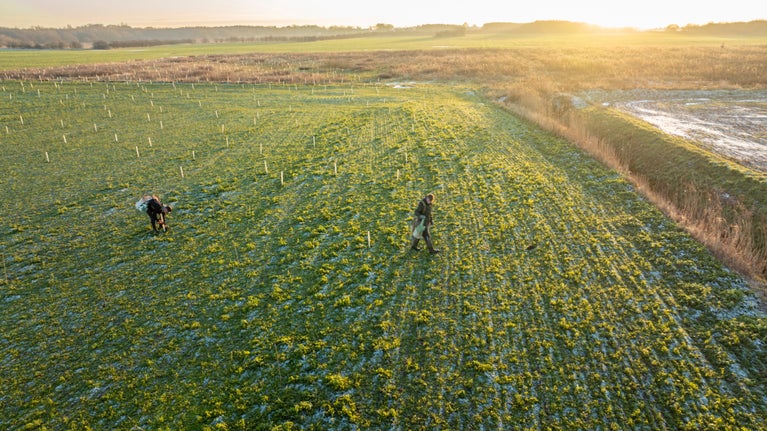
Tackling climate change
Uncover how we’re responding to the changing climate at places in our care.

Following successful river restoration projects in the US, the National Trust piloted the riverlands floodplain reconnection at the Holnicote estate in Somerset, which was the first time the technique was used in the UK. Discover how this project enriched biodiversity, stored carbon, and purified water.
Inspired by successful river restoration projects in America, the National Trust piloted riverlands floodplain reconnection at our Holnicote estate, the first time the technique had been tried in the UK. This nature positive approach to restoration and land management works with natural processes to enrich biodiversity, store carbon, and slow and purify water.
As part of the Riverlands project at Porlock we’ve taken an innovative approach to river restoration. Using earth moving equipment we re-naturalised the flow of water of the River Aller across the landscape, infilled the historic drainage and used woody debris to develop more natural flow, giving water space and developing increased ecosystem function with benefits for people and nature.
The two-week restoration was undertaken in October 2019 and in just over a year we have achieved complex channel structure and vegetation, reconnection of aquatic and terrestrial ecosystems, and slower flow with multiple smaller channels, pools, riffles and valuable wetland habitat. There have been benefits for wildlife through development of more complex and abundant ecosystems and creation of a mosaic of different habitats, providing a suitable home for species like the endangered water vole, bats and amphibians. The changes implemented are developing a resilient landscape which is better at adapting to the challenges of climate change, acting as a buffer in times of flood and allowing aquifers to recharge in times of drought.
Future phases of the project will restore natural function to a significant part of the Aller catchment (over 130 ha) as well as a lower reach of the Hawkcombe river, where we’ll develop complex intertidal habitat by allowing the flow of the river out across its floodplain - delivering improved habitats for nature and resilience to the effects of climate change. This work is being combined with wider landscape interventions. We’ll support farmers to demonstrate an economically and environmentally sustainable approach to farming that promotes biodiversity and supports ‘net-zero’ targets, for example working with local farmers to deliver conservation grazing with native breed livestock over more than 2500 ha of National Trust owned land.
This is a case study linked to the Climate and Land Summit hosted by the National Trust at the Wimpole Estate, in Cambridgeshire, on October 12, 2021, before the UN's annual climate conference COP26 in Cornwall that year.
Attendees at the summit represented some of England’s largest landowners and managers, and signed up to six guiding principles to commit to collectively working towards the nation’s net zero aims and pressing needs to adapt to a rapidly changing climate. To read the text of the Compact click here.

Uncover how we’re responding to the changing climate at places in our care.

Learn about the six climate and nature-based targets discussed at the Climate and Land Summit and how the solutions are being applied at National Trust places.

With support from the Government’s Green Recovery Challenge Fund, we're looking for ways to protect our environment and combat climate change. Find out more about the work we're doing.

From tips on saving water to combatting plastic pollution, learn more about our work to protect precious coasts and rivers for wildlife and people, and what you can do to help.

Discover the vital ways peat supports the environment, from carbon store to archaeological record, and see some of our key projects protecting and restoring the peatland in our care.

We’re tackling the threats of a changing coastline to safeguard the places you love. Find out how our teams are adapting their approach to our shifting shores.

Discover more about the National Trust’s role at COP26 in Glasgow and how you can help tackle the climate crisis.